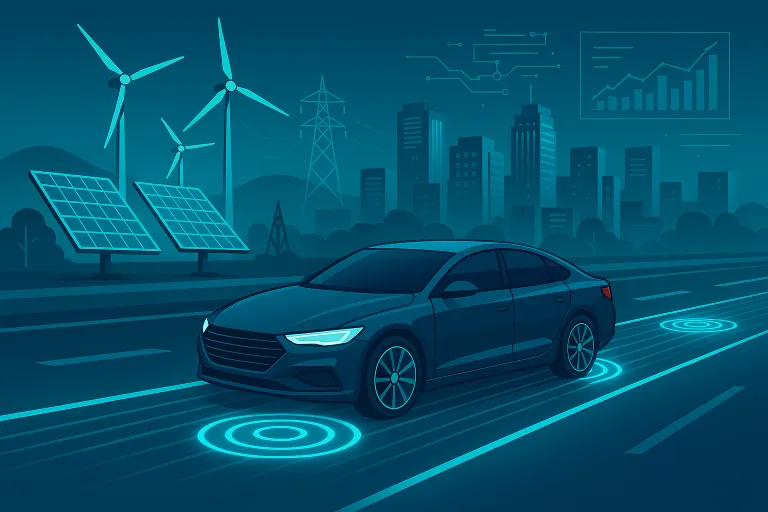Introduction: AI-Powered Self-Charging Roads — Myth or Reality?
AI-powered self-charging roads sound like something out of a sci-fi movie—but they’re rapidly becoming a tangible solution to one of the biggest challenges in electric vehicle (EV) adoption: charging infrastructure. With smart road charging technology gaining momentum, cities and innovators are exploring ways to embed wireless charging directly into roadways, powered by artificial intelligence.
This article dives deep into the technology, real-world applications, limitations, and future potential of AI-powered self charging roads, offering a clear picture of how this innovation could reshape transportation.
Table of Contents
What Are AI-Powered Self-Charging Roads?

At their core, AI-powered self-charging roads are intelligent roadways embedded with inductive coils and sensors that wirelessly charge EVs as they drive. These systems use AI algorithms to optimize energy transfer, monitor traffic, and manage grid load dynamically.
Key Components:
- Inductive Charging Coils: Embedded beneath the road surface to transmit energy wirelessly.
- AI Controllers: Analyze traffic flow, vehicle types, and battery levels to optimize charging.
- Smart Sensors: Monitor road conditions, usage, and energy efficiency in real time.
This seamless charging experience eliminates the need for frequent stops and reduces range anxiety for EV drivers.
Global Case Studies: Smart Road Charging Technology in Action
Several countries have already begun testing smart road charging technology, proving that this concept is more than theoretical.
Sweden – eRoadArlandaA
2km stretch of road charges EVs via a conductive rail embedded in the surface. It’s one of the first large-scale implementations of dynamic charging.
Israel – Electreon
Wireless charging roads for buses and taxis are being tested in Tel Aviv, using inductive coils and AI-based traffic management.
Michigan, USA
The state launched a pilot project to test inductive charging highways, aiming to support both passenger and commercial EVs.
These projects demonstrate the feasibility of AI-powered self-charging roads and highlight the growing interest in sustainable infrastructure.
Benefits of AI-Powered Self-Charging Roads
✅Continuous Charging
EVs can charge while driving, eliminating downtime and improving convenience.
✅ Reduced Range Anxiety
Drivers no longer worry about battery levels or locating charging stations.
✅ Grid Optimization
AI balances energy demand and supply, reducing stress on the power grid.
✅ Lower Maintenance Costs
Predictive analytics prevent breakdowns and extend infrastructure lifespan.
✅ Enhanced Sustainability
Integration with renewable energy sources like solar and wind reduces carbon emissions.
Challenges and Limitations
Despite the promise, AI-powered self-charging roads face several hurdles:
- High Installation Costs: Embedding coils and sensors is expensive and labor-intensive.
- Energy Efficiency: Wireless charging loses more energy than plug-in methods.
- Standardization Issues: EVs must be compatible with road systems.
- Infrastructure Retrofitting: Upgrading existing roads is complex and costly.
These challenges must be addressed before widespread adoption becomes viable.
How AI Enhances Smart Road Charging Technology
AI is the backbone of smart road charging technology, enabling real-time decision-making and optimization.
Predictive Maintenance
AI detects wear and tear before it becomes a problem, reducing downtime.
Dynamic Energy Allocation
Power delivery is adjusted based on traffic density, vehicle type, and battery status.
Autonomous Vehicle Integration
AI-powered roads work seamlessly with self-driving EVs, optimizing routing and charging.
Data-Driven Insights
AI analyzes usage patterns to improve road design, energy efficiency, and traffic flow.
Integration with Renewable Energy Sources
One of the most exciting aspects of AI-powered self-charging roads is their potential to integrate with renewable energy.
- Solar Panels: Roads can be equipped with solar panels to generate clean energy.
- Wind Turbines: Roadside turbines can supplement power supply.
- Smart Grid Connectivity: AI ensures optimal use of renewable energy based on availability and demand.
This synergy supports global sustainability goals and reduces reliance on fossil fuels.
AI-Powered Road Infrastructure in Smart Cities

Smart cities are embracing AI-powered self-charging roads as part of their broader infrastructure strategy.
- Real-Time Traffic Management: AI adjusts traffic signals and charging based on congestion.
- Vehicle To Infrastructure Communication: EVs communicate with roads to optimize charging.
- Urban Planning Integration: Charging roads are strategically placed to support public transport and reduce emissions.
Cities like Amsterdam and Oslo are already experimenting with these technologies.
Market Trends and Forecasts

According to Cyberswitching, the market for AI-powered EV infrastructure is expected to grow exponentially by 2030. Governments and private companies are investing heavily in smart mobility solutions, making AI-powered self-charging roads a key component of future transportation networks.
Internal & External Links :-
Read More :- EV Charging Guide 2025: Types, Speed & Connector Compatibility Explained
Sorce by :- Smart Charging with AI & IoT
FAQs :-
Q1: What is an AI-powered self-charging road?
It’s a road embedded with inductive coils and smart sensors that wirelessly charge EVs using AI to optimize energy flow.
Q2: Are self-charging roads available today?
Yes, pilot projects exist in Sweden, Israel, and the US, proving the concept is viable.
Q3: How does AI improve road charging technology?
AI enables predictive maintenance, dynamic energy allocation, and seamless integration with autonomous vehicles.
Q4: Is smart road charging technology safe?
Yes, it uses low-frequency electromagnetic fields and is tested for safety compliance.
Q5: Will this technology replace traditional EV chargers?
Not entirely. It will complement existing infrastructure, especially for long-distance travel.


2 thoughts on “Top 9 Reasons Why AI-Powered Self-Charging Roads Will Revolutionize EV Mobility in 2025”